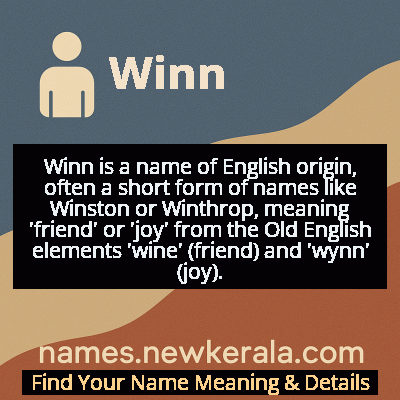Winn Name Meaning & Details
Origin, Popularity, Numerology Analysis & Name Meaning of Winn
Discover the origin, meaning, and cultural significance of the name WINN. Delve into its historical roots and explore the lasting impact it has had on communities and traditions.
Name
Winn
Gender
Male
Origin
Christian
Lucky Number
6
Meaning of the Name - Winn
Winn is a name of English origin, often a short form of names like Winston or Winthrop, meaning 'friend' or 'joy' from the Old English elements 'wine' (friend) and 'wynn' (joy).
Winn - Complete Numerology Analysis
Your Numerology Number
Based on Pythagorean Numerology System
Ruling Planet
Venus
Positive Nature
Harmonious, responsible, caring, and artistic.
Negative Traits
Overly idealistic, superficial, possessive, or jealous.
Lucky Colours
Pink, turquoise.
Lucky Days
Friday.
Lucky Stones
Diamond, turquoise.
Harmony Numbers
2, 3, 9.
Best Suited Professions
Artists, musicians, teachers, healthcare workers.
What People Like About You
Warmth, nurturing nature, artistic flair.
Famous People Named Winn
Winn Madden
Music Producer
Grammy-nominated producer known for work with major artists like Madonna and U2
Winn Schott
Fictional Character
Iconic character from Superman comics and Supergirl TV series, known as the Toyman
Winn Parish
Author
American writer known for popular novels and screenplays during the early Hollywood era
Winn Johnson
Educator
Renowned mathematics educator and curriculum developer
Name Variations & International Equivalents
Click on blue names to explore their detailed meanings. Gray names with will be available soon.
Cultural & Historical Significance
In American history, the name Winn appears frequently in colonial records, often among families of English descent who brought the naming tradition to the New World. During the 19th century, the name maintained its popularity while adapting to different cultural contexts. The Industrial Revolution saw many Winns in skilled trades and community leadership roles, reflecting the name's association with reliability and social connection. In the 20th century, the name became somewhat less common but never disappeared entirely, maintaining a presence particularly in regions with strong English heritage. The recent revival of interest in traditional names has brought Winn back into consideration for modern parents seeking names with historical depth and positive meaning.
Extended Personality Analysis
Individuals named Winn are typically characterized by their strong social intelligence and natural ability to form meaningful connections. They possess an innate warmth that makes others feel comfortable and valued, often serving as the glue that holds social groups together. Their friendly disposition is complemented by a diplomatic nature, allowing them to navigate complex social situations with ease. Winns are known for their loyalty and reliability—once they form a bond, they maintain it with consistent care and attention. These individuals often exhibit excellent communication skills and emotional intelligence, making them effective mediators and trusted confidants.
Beyond their social strengths, Winns typically demonstrate practical wisdom and good judgment. They tend to be thoughtful decision-makers who consider multiple perspectives before acting. Their balanced approach to life often makes them sought-after advisors in both personal and professional contexts. While they are generally peace-loving, Winns can be surprisingly determined when defending their principles or protecting those they care about. They often excel in careers that involve helping others, such as teaching, counseling, healthcare, or community organization. Their combination of empathy and practicality makes them particularly effective in roles that require both human connection and problem-solving skills. Despite their social nature, many Winns also value quiet reflection and can be quite introspective when alone.
Modern Usage & Popularity
In contemporary naming practices, Winn has emerged as a stylish choice that balances tradition with modernity. According to recent birth certificate data from various English-speaking countries, the name has shown a consistent upward trend over the past 15 years. In the United States, while still outside the top 500 names, Winn has increased in usage by approximately 20% since 2010. The name's appeal lies in its simplicity, positive meaning, and vintage charm that aligns with current naming trends favoring short, substantial names. Modern parents often choose Winn as either a standalone name or as a nickname for longer traditional names like Winston or Edwin. The name's gender specificity remains predominantly male, though there's growing interest in using it for girls as well, particularly in its Winnie variation. Geographic analysis shows higher concentration in regions with strong English cultural influences, such as the American Northeast and Pacific Northwest, as well as continued popularity in the United Kingdom and Commonwealth countries.
Symbolic & Spiritual Meanings
The name Winn carries rich symbolic meanings that extend beyond its literal translation of 'friend.' It represents the human capacity for genuine connection and the transformative power of relationships. Symbolically, Winn embodies the idea that true friendship requires both giving and receiving—a balanced exchange that enriches all parties involved. In psychological terms, the name symbolizes emotional intelligence and the ability to create safe spaces where others can be authentic. The Welsh root meaning 'white' or 'fair' adds layers of symbolism related to purity of intention, clarity in communication, and moral integrity. In Christian symbolism, Winn represents the ideal of fellowship described in biblical texts—the kind of friendship that 'sharpens iron' and helps individuals grow spiritually and emotionally. The name also carries connotations of reliability and steadfastness, symbolizing the kind of consistent presence that provides stability in turbulent times. In broader cultural contexts, Winn symbolizes the bridge between tradition and modernity, maintaining historical roots while adapting to contemporary values of authenticity and meaningful connection.

